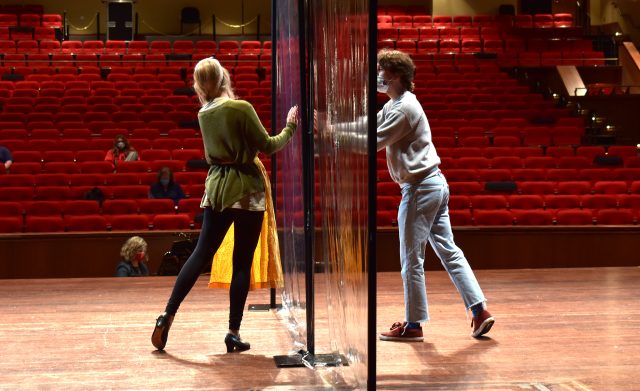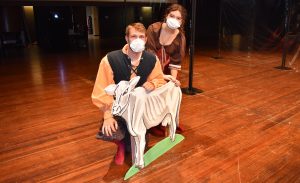
Senior vocal performance majors Madi Morris (left), of Starkville, and John Michael Walker, from Olive Branch, rehearse a duet from ‘The Merry Wives of Windsor’ for UM Opera’s upcoming production of ‘It Takes Two’ at the Ford Center. Masks and distancing will help make this a safe environment for both performers and spectators. Photo by Lynn Adams Wilkins/UM Department of Music
OXFORD, Miss. – How do you safely present singers in a live performance during a pandemic? “The old joke would be, ‘very carefully,'” said Julia Aubrey, director of the University of Mississippi Opera Theatre and associate professor of music.
The UM Opera Theatre presents a live performance of “It Takes Two: Duets from Opera, Operetta and Musical Theatre” at 7:30 p.m. Saturday (Nov. 7) and 3 p.m. Sunday (Nov. 8) at the Gertrude C. Ford Center for the Performing Arts.
Tickets are $5 each, and are available from the Ole Miss Box Office, phone 662-915-7411, as singles or in family groups. Reserved seating will ensure that safe distances are maintained.
The performers will offer different programs each day, with each program lasting about an hour each, Aubrey said. Both audience and performers will observe safety measures, including masks.
“It took some imagination and careful planning to come up with a way to have individuals on stage together while singing and not be together,” she said, referring to the impact of music-making protocols on the annual opera scenes program. “This year, we chose to stage only duets to allow every student an opportunity to display their performance skills in public.”
Many of the duets are among the most recognizable and beloved in all of music, and will be familiar to audiences, even those with no particular knowledge of opera and musical theatre.
Junior vocal performance majors Alexis Rose and Emma Johnson, for example, sing the Flower Duet from “Lakmé” (“Viens Mallika … Sous le dome épais”). The twining soprano and mezzo-soprano voices will be instantly recognizable to listeners who heard the distinctive melody in commercials, movies or TV.
Being able to perform classic pieces such as this – being able to perform at all, actually – is not something that Rose and Johnson take for granted.
“Performing right now means so much,” said Rose, an Ole Miss Women’s Council scholar from Omaha, Nebraska, noting that all the singers are happy to comply with COVID protocols because they allow them to sing together and perform for the public.
Johnson, a member of the Sally McDonnell Barksdale Honors College from Paducah, Kentucky, agrees. “My friends at other schools are not able to perform as easily,” she said.
The creative minds behind UM Opera Theatre knew that working within the demanding protocols that govern singing would necessarily change this year’s scenes program. The resulting shows don’t just observe the protocols, they lean in and leverage them for dramatic effect.
“We constructed three large plastic walls to create four 12-by-16 acting areas,” Aubrey said. “Romeo and Juliet perform their love duet separated by a transparent wall, yet are still able to convey their passionate relationship.”
Sometimes the walls are invisible to the actors, and sometimes they stand in for an actual obstacle, such as the hedge maze that divides Carolina and Paolino in a scene from “Il Matrimonio segreto” (The Secret Marriage), Aubrey explained.
“Sometimes the wall is a metaphor, such as the barrier created by parents and society in ‘Romeo and Juliet,'” she said.
The wall supports the idea that the characters have real obstacles that keep them apart, said Madi Morris, a senior vocal performance major who performs two duets dealing with forbidden love.
“In the beginning it was really strange to sing a love duet and not be able to interact with each other physically,” said Morris, from Starkville. “Now, I don’t even notice it anymore, except as a symbol within the scene of the separation that the lovers are facing.
“Although I still would prefer not to have the wall, I’ll happily work with it to make live music with my fellow performers. The show must go on!”

John Simmons (left), an Ole Miss sophomore from Oxford, and Alexis Rose, a junior from Omaha, Nebraska, play the baker and his wife in a scene from Stephen Sondheim’s ‘Into the Woods.’ The duet is part of UM Opera Theatre’s ‘It Takes Two,’ which features two different one-hour shows: one at 7:30 p.m. Saturday, and the other at 3 p.m. Sunday, both at the Ford Center. Photo by Lynn Adams Wilkins/UM Department of Music
The separated performance space is not the only adjustment UM Opera Theatre is making the best of: the singers will wear masks, as they have been during the rehearsal process.
“The ongoing pandemic and necessary safety protocols necessitated a program of duets, in order to have sufficient social distancing,” said Amanda Johnston, music director and vocal coach for UM Opera Theatre and associate professor of music, noting a silver lining. “It ended up being an opportunity to explore fabulous duet repertoire from Monteverdi to Weber.”
Johnston serves as a collaborative pianist for the singers. “Each singer has two duets, in two different languages,” she said.
Johnston rehearsed with the singers in Nutt Auditorium and in the Opera Rehearsal Room, using a set-up of Plexiglas barriers and social distancing. The mask requirement has provided opportunities for the singers to think about their performances in new ways, she said.
“All of us have been masked throughout the process, which has presented vocal challenges related to efficient and effective breathing while sufficiently articulating the text,” she explained. “I am very proud of the students, who have explored greater expressivity and communication with their voices – without the help of facial expressions.”
Performing with a mask means the singers must be more in touch with their bodies, singer Johnson said.
“To compensate for the masks, we’ve worked hard to use our eyes and body for expression, in addition to our voices,” Rose said.
Korynn Lacher, a master’s student in vocal performance, and Isaiah Traylor, a senior vocal performance major from Tupelo, perform “O soave fanciulla,” from Puccini’s “La Bohéme,” one of the most famous musical duets in all opera.
“Performing this piece is a dream come true,” said Lacher, of Richland, Washington. “It’s so famous, but it’s also such an important part of the opera.”
Depicting the moment when Mimi and Rodolfo meet, the scene describes “young, fresh love, so innocent and pure,” she said.
One of the great appeals of this duet is the way that the music matches the soaring emotion of a first encounter, Lacher said.
“The soaring vocal lines require a certain power to the voice – a passion that has to be portrayed in the voice,” she said, adding that she appreciates the opportunity to concentrate on using her voice and body to communicate the emotion, since the mask will obscure much of her face.
“Has it been a challenge to forget one is wearing a mask and prevented from occupying the same space as one’s partner?” Aubrey said. “Yes!”
The director said she looks forward to the audience getting a chance to see how the performers have overcome those obstacles, and expects that the music and performances will make audiences forget everything else but these standout duets.
“We have programmed familiar duets by Puccini, Mozart, Sondheim, Gilbert and Sullivan, and many more notable composers,” Aubrey said. “We have made the program highly accessible with supertitles for all foreign language scenes, and both shows are intended for a general audience.”